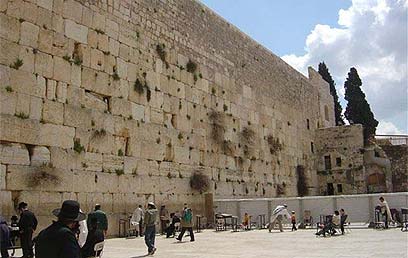_a.jpg)
Where do all the prayer notes go?
Rabbi Shmuel Rabinowitz is in charge of clearing up the hundreds of thousands of notes left by visitors at the Western Wall; he is also the one who places letters and faxes addressed to 'God in Jerusalem' between the wall's cracks
People from around the world place their prayers in Jerusalem's Western Wall or mail them to "God, Jerusalem". It's Rabbi Shmuel Rabinowitz who clears them up.
Millions of people a year visit the Western Wall—one of Judaism's holiest sites—and leave a written prayer on pieces of paper wedged into the cracks of the ancient stones.
The tradition has been adopted by members of many faiths around the world. It is very common for Christian pilgrims traveling through the Old City of Jerusalem to stop by the Western Wall and leave a note, the rabbi says.
As Rabbi of the Western Wall, it is up to Rabinowitz to make sure there's room for future paper wishes. Twice a year his team collects hundreds of thousands of notes and buries them on Jerusalem's Mount of Olives.
"The notes are a way to pray if you don't know how. After all, if you want to receive, you have to ask," said Rabinowitz from his office in the Old City of Jerusalem.
'To God in Jerusalem'
Rabinowitz and a dozen workers sweep the wall with wooden sticks in order to reach up high to snare the notes closest to the heavens.
They never read them and have never counted the number of scripted prayers, but in each collection there are enough to fill about 100 shopping bags, each with thousands of notes, Rabinowitz said.
The rabbi's office, which manages the site, estimates that more than 5 million people visited the Western Wall in 2006. Israel's Tourism Ministry said that about 1.5 million of them were foreign tourists.

Photo: Michael Khouri
Other letters are sent to the wall by fax or email—often for a small fee. Rabinowitz said he places hundreds of letters a year received by the post office addressed simply to God in Jerusalem.
Because the notes are never read by those who collect them it is impossible to know the religion of the people who sent them, the rabbi said.
"You can ask for anything. You spill your heart and then you leave strengthened," said Moshe Azolai, 29, who visited the site with relatives from the United States.
Azolai left a prayer for his nephew, who was one of several 13-year-old boys being honored in a Bar Mitzvah ceremony in the hot summer sun.
The tradition of leaving notes started nearly 300 years ago when a rabbi sent his students with a prayer in writing because he was unable to make the journey, Rabinowitz said.
Burn or bury?
An entire chapter in one of Rabinowitz's books deals with the issue of discarding the Western Wall notes.
"There is an old argument about whether to burn the notes or bury them," Rabinowitz said.
According to Jewish law, it is forbidden to destroy holy texts. Instead, prayer books and scriptures are "reposited" in containers and often buried in Jewish cemeteries.
Rabinowitz said burning is a pure way to deal with the notes, but burying them according to Jewish tradition is more honorable.










